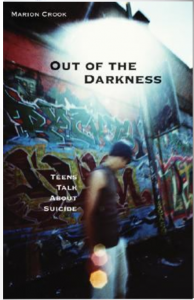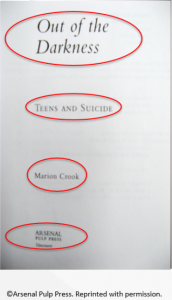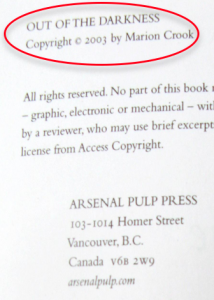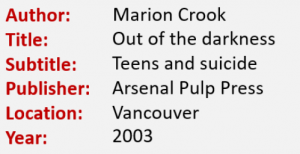50 Chicago: Book Citation
Chicago Style usually uses either footnotes or endnotes as in the writeup to indicate a citation. Both require that you supply the full citation information the first time you cite an item. Subsequent citations can be abbreviated. Check the Library Citation Style Guide for examples.
The basic elements for books in print consist of:
- Author
- Title and (if available) subtitle
- Publishing information
- Year
You usually find this information on the title page of the book and the back of the title page.
Example:



Note that in our example the subtitle on the book cover says “Teens talk about suicide” while the subtitle on the title page is ”Teens and suicide”. Always go by the information on the title page.

How would an in-text citation from this book look?
You need to place a superscript number after the end punctuation of your citation, like this.1 Footnotes appear at the bottom of the individual page where you cite, are single-spaced, and are preceded by the same number in regular script. If you decide to use endnotes, then all notes would appear in one list at the end of your write-up on a new page with the heading Notes, and before your bibliography. You will also need to include the page number(s) in your in-text citation.
Example:
Crook states that “the most difficult thing for them was the attitude of their parents”1
____________________________
1. Marion Crook, Out of the Darkness: Teens and Suicide (Vancouver, BC: Arsenal Pulp, 2003), 157.
How does the citation for this book look like in the bibliography?
For the bibliography entry, use the following template:
Chicago Basic Book Template
Author last name, Full Given Names. Title: Subtitle. Publishing Location: Publisher, Year.
Bibliography entry for this book
Crook, Marion. Out of the Darkness: Teens and Suicide. Vancouver, BC: Arsenal Pulp, 2003.
Note: these are the basic elements for a book citation, but sometimes there will be additional information you need to add, such as editors or edition information; or some elements, such as an author, may not be available.
What if there is no author? What if there are multiple authors? What if there is no date?
Whatever the situation, you still need to cite your source. Check out the Chicago Citation guide for answers to these and other questions, and if you need help, please ask a librarian.

